Generative AI certifications can help you stand out from other job candidates in the dynamic field of generative artificial intelligence. As the field continues to evolve, organizations will keep investing in skilled staff who can develop and implement the technology.
Gen AI certifications validate your expertise and demonstrate your skills to employers as the demand for skilled tech professionals increases. I evaluated a wide range of certifications to see how they compared in terms of level, duration, and cost. Here are my picks for the top generative AI certifications.
- Introduction to Generative AI: Best for learning basic generative AI concepts
- Microsoft Azure AI Fundamentals (Generative AI): Best for familiarizing with Azure AI Studios
- Generative AI Overview for Project Managers: Best for understanding AI in project management
- NVIDIA-Certified Associate Generative AI LLMs: Best for demonstrating expertise in generative AI and LLMs using NVIDIA solutions
- IBM Generative AI for Data Scientists Specialization: Best for applying generative AI in data science projects
- AWS Generative AI with Large Language Models: Best for real-world use case of generative AI and LLMs
- IBM Generative AI for Software Developers Specialization: Best for integrating AI into development workflows
TABLE OF CONTENTS
Best generative AI certifications: Comparison chart
Here’s a summary of the experience level, certifying institutions, duration, cost, and prerequisites of the seven top generative AI courses to help you find the right fit for your skills and interests. Keep reading for more detailed information about each of our picks.
| AI certification | Certifying body | Level | Duration | Cost | Prerequisites |
| Introduction to Generative AI | Google Cloud | Beginner | One hour | $59 per month | No prerequisites |
| Microsoft Azure AI Fundamentals: Generative AI | Microsoft Learn | Beginner | Three hours | Free | Familiarity with Azure and the Azure portal |
| Generative AI Overview for Project Managers | Project Management Institute (PMI) | Beginner | One hour | Free | No prerequisites |
| NVIDIA-Certified Associate Generative AI LLMs | NVIDIA | Intermediate | One hour | $125 | Basic understanding of generative AI and LLMs |
| Generative AI for Data Scientists Specialization | IBM | Intermediate | One month at 10 hours a week | $49 per month | Prior data science experience |
| Generative AI with Large Language Models | AWS and DeepLearning.AI | Intermediate | 16 hours | $49 per month | Some experience coding in Python |
| Generative AI for Software Developers Specialization | IBM | Intermediate | One month at 10 hours a week | $49 per month | Some software engineering knowledge |
Top seven AI certifications
Generative AI certification programs provide valuable skills for staying ahead in the dynamic field of AI, unlocking better job prospects with higher salaries.
Introductory generative AI courses cover the basics of machine learning, neural networks, and AI ethics. In contrast, specialized courses include lessons on natural language processing (NLP), image generation, and deep learning models. Advanced learners can also earn certificates that validate expertise in building and deploying generative AI models for applications in content creation, design, and automation.
Introduction to generative AI
Best for learning basic generative AI concepts | Beginner level
This introduction to generative AI course, offered by Google Cloud Training instructors on Coursera, provides an overview of the fundamental concepts of generative AI. The one-module course covers a range of topics, from the basics of generative AI to its applications. By the end of the course, you’ll be able to define generative AI, explain how it works, understand the different model types, and explore its various applications.
Top seven AI certifications
Generative AI certification programs provide valuable skills for staying ahead in the dynamic field of AI, unlocking better job prospects with higher salaries.
Introductory generative AI courses cover the basics of machine learning, neural networks, and AI ethics. In contrast, specialized courses include lessons on natural language processing (NLP), image generation, and deep learning models. Advanced learners can also earn certificates that validate expertise in building and deploying generative AI models for applications in content creation, design, and automation.
Introduction to generative AI
Best for learning basic generative AI concepts | Beginner level
This introduction to generative AI course, offered by Google Cloud Training instructors on Coursera, provides an overview of the fundamental concepts of generative AI. The one-module course covers a range of topics, from the basics of generative AI to its applications. By the end of the course, you’ll be able to define generative AI, explain how it works, understand the different model types, and explore its various applications.
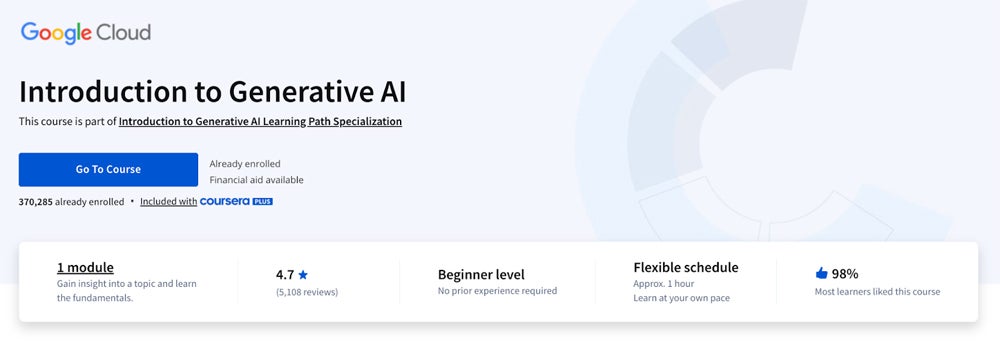
Why I picked it
I chose this course because it offers a concise and informative introduction to generative AI. This course is specifically designed for those without prior knowledge of the field. The instructors use clear explanations and avoid complex jargon, making it accessible to anyone interested in the topic.
The course also introduces Google tools for developing your own generative AI applications. As part of Google’s Introduction to Generative AI Learning Path specialization, Introduction to Generative AI allows you to build subject-matter expertise in this field and develop job-relevant skills with hands-on projects throughout the program.
Skills acquired
At the end of this course, you will gain an understanding of the following:
- Definition of generative AI
- Generative AI model types
- How generative AI works
- Various generative AI applications
Key course details
Whom it’s for
- Beginners looking for an introductory course on Generative AI and its real-world applications
Career tracks
- Data analyst, prompt engineer, and AI product manager
Course requirements
- No prerequisites
Course fee, duration, and format
- Free to audit
- $59 per month Coursera Plus subscription for a shareable certificate
- One hour to complete
- Self-paced online learning via Coursera
Course content and assessments
- Explains what generative AI is, how it’s used, and how it differs from traditional machine learning methods
- Covers Google Tools to help you develop your generative AI apps
- One assessment is required to pass
- Part of the Introduction to Generative AI Learning Path Specialization
Microsoft Azure AI Fundamentals: Generative AI
Best for familiarizing with Azure AI studio | Beginner level
The Azure AI Fundamentals Generative AI course introduces generative AI technology, focusing on Microsoft Azure services and covering the fundamentals of generative AI.
This course also explains how large language models form the foundation of generative AI and details the capabilities of Azure AI Studios, the efficiency gains provided by generative AI applications like copilots, the importance of fine-tuning prompts and responses, and how Microsoft’s responsible AI principles drive ethical AI advancements in the field of generative AI.
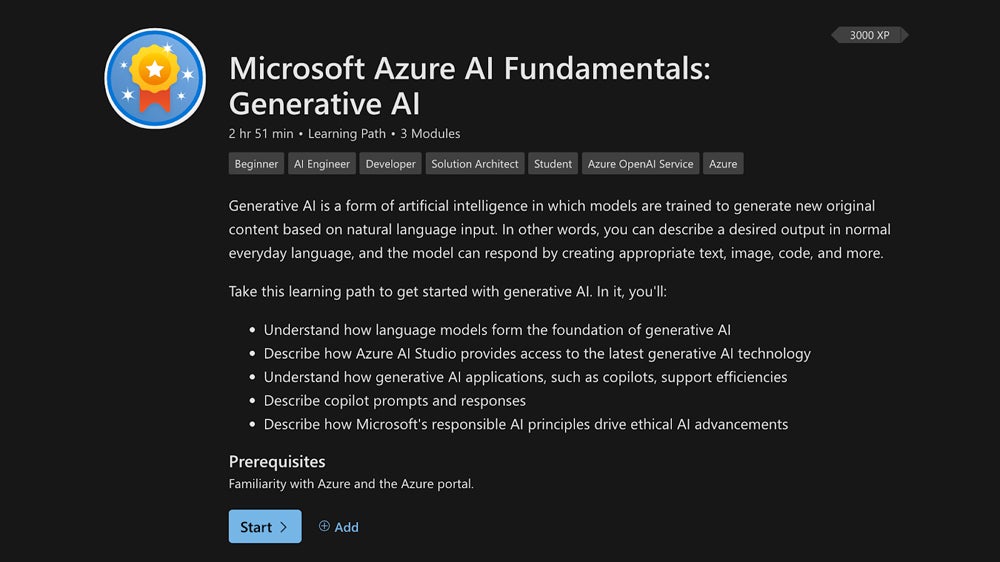
Why I picked it
I chose this course because it covers fundamental concepts and practical applications of generative AI technology, focusing on Azure services. Its main objective is to help you learn how to use Azure AI Studio and understand the importance of responsible AI principles.
This course will also teach you how to design a responsible generative AI solution, assess and minimize potential risks, and effectively manage its operation. As a Microsoft Learn course, it provides direct insights from industry experts and exclusive access to Microsoft resources, ensuring you learn best practices from the leaders in the field.
Skills acquired
By the end of the course, you’ll be able to understand the following:
- How LLMs form the foundation of generative AI
- The capabilities of Azure AI Studio
- How generative AI applications like copilots improve efficiency
- How to fine-tune prompts and responses for better outcomes
- Ethical considerations and responsible AI principles in developing and deploying generative AI solutions
Key course details
Whom it’s for
- Beginner- to intermediate-level Microsoft developers who want to leverage the Azure OpenAI Service to build AI-powered solutions
Career tracks
- AI engineers, developers, and solution architects
Course requirements
- Familiarity with Azure and the Azure portal
Course fee, duration, and format
- Free
- Four hours
- Self-paced online learning via Microsoft Learn
Course content and assessments
There are four modules in this course:
- Introduction to generative AI
- Plan and prepare to develop AI solutions on Azure
- Implement a responsible generative AI solution in Azure AI Foundry
- Get started with AI agent development on Azure
Generative AI Overview for Project Managers
Best for understanding AI in project management | Beginner level
The Generative AI Overview for Project Managers is an online course offered by the Project Management Institute (PMI) as part of its professional development course portfolio. It is designed to give project managers a comprehensive understanding of artificial intelligence and generative AI, as well as its various applications in project management.
By completing this course, project managers will also earn five PDUs (four for Ways of Working and one for Business Acumen).
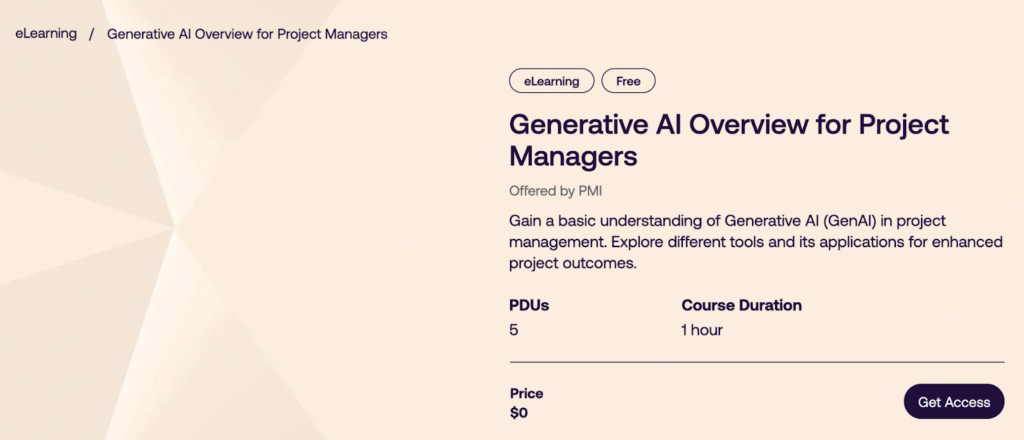
Why I picked it
As a microlearning course offered by PMI, a globally recognized authority in project management, project managers can trust the quality and credibility of its content. I picked this course because it helps project managers enhance their understanding and application of generative AI within the project management domain.
This course offers a hands-on learning experience that project management professionals can apply to their next project. Its content has also been updated to reflect the latest on generative AI, including new resources, practical examples, recent thought leadership research, and access to PMI Infinity in the AI Tool Library.
Skills acquired
By the end of the course, you’ll gain a deep understanding of the following:
- Definitions of artificial intelligence (AI) and generative AI
- Generative AI applications in project management
- Generative AI project manager tools for maximizing efficiency
- Best practices for project management in AI as a way of working
Key course details
Whom it’s for
- Project managers who want to learn more about generative AI within the project management domain
Career tracks
- Project manager, project coordinator, and agile facilitator
Course requirements
- No prerequisites
Course fee, duration, and format
- Free
- One hour
- Self-paced online learning via the Project Management Institute
Course content and assessments
There are five lessons in this micro-learning course:
- Introduction to GenAI
- Enhancing PM with GenAI
- Voice of the PM
- ChatGPT Lab
- AI Tool Library
NVIDIA-Certified Associate Generative AI LLMs
Best for demonstrating expertise in generative AI and LLMs using NVIDIA solutions | Intermediate level
The NVIDIA-Certified Associate Generative AI LLMs certification is a foundational credential for individuals involved in developing, integrating, and maintaining AI-driven applications using generative AI and large language models with NVIDIA solutions. This certification validates the fundamental concepts required for working with generative AI and LLMs, making it an efficient learning opportunity for AI DevOps engineers, data scientists, ML engineers, and more.
The exam for this certification covers essential topics, including machine learning fundamentals, neural networks, prompt engineering, data analysis, experimentation, software development, Python libraries for LLMs, integration, and deployment.
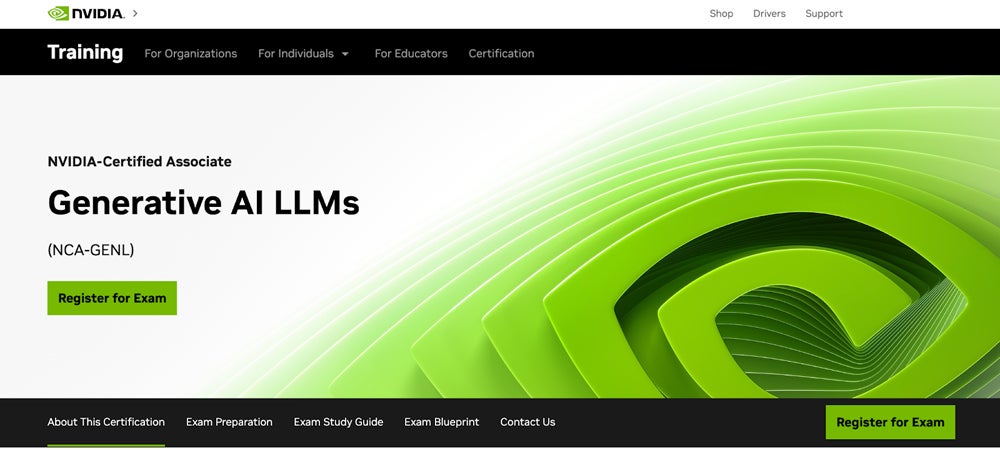
Why I picked it
Understanding how to train, fine-tune, and deploy LLMs is an essential skill for AI developers. This certification is designed to assess your knowledge and skills in generative AI and LLMs within the context of NVIDIA’s solutions and frameworks.
As an official NVIDIA certification, it’s recognized within the industry and shows employers you have the necessary skills and knowledge to work with NVIDIA’s leading AI solutions. Ultimately, this certification provides you with an edge within a competitive field because it combines industry recognition, practical applications, and alignment with NVIDIA solutions.
Skills acquired
This certification will give you a range of foundational skills and knowledge in the following areas:
- Fundamentals of ML and neural networks
- Prompt engineering
- Data analysis and visualization
- Data preprocessing and feature engineering
- Experiment design
- Python libraries for LLMs
- LLM integration and deployment
Key course details
Whom it’s for
- Entry-level AI professionals, data scientists, and senior researchers who want to validate their skills in generative AI and LLMs using NVIDIA solutions
Career tracks
- AI developer, ML engineer, software engineer, and data scientist
Certification exam requirements
- Basic understanding of generative AI and large language models
Exam fee, duration, and format
- $125
- One hour (50–60 questions)
- Online and proctored remotely
Exam content and assessments
Topics covered in the exam include the following:
- Fundamentals of machine learning and neural networks
- Data analysis and visualization
- Data preprocessing and feature engineering
- Python libraries for LLMs
- LLM integration and deployment
Upon passing the exam, participants will receive a digital badge from NVIDIA and an optional certificate that indicates the certification level and topic. The certification is valid for two years from its issuance, and recertification may be achieved by retaking the exam.
Generative AI for Data Scientists Specialization
Best for applying generative AI in data science projects | Intermediate level
Taught by four experts from IBM, the Generative AI for Data Scientists Specialization course on Coursera is designed to help data professionals understand and implement generative AI in their data science projects. It is a three-course specialization that covers the basics of generative AI, prompt engineering concepts, tools, and techniques, and how to apply generative AI throughout the data science methodology.
The specialization includes hands-on projects and activities to reinforce learning and practical application of generative AI skills. Participants will learn how to use generative AI models for text, code, image, audio, and video generation, as well as data augmentation, feature engineering, and model development and refinement.
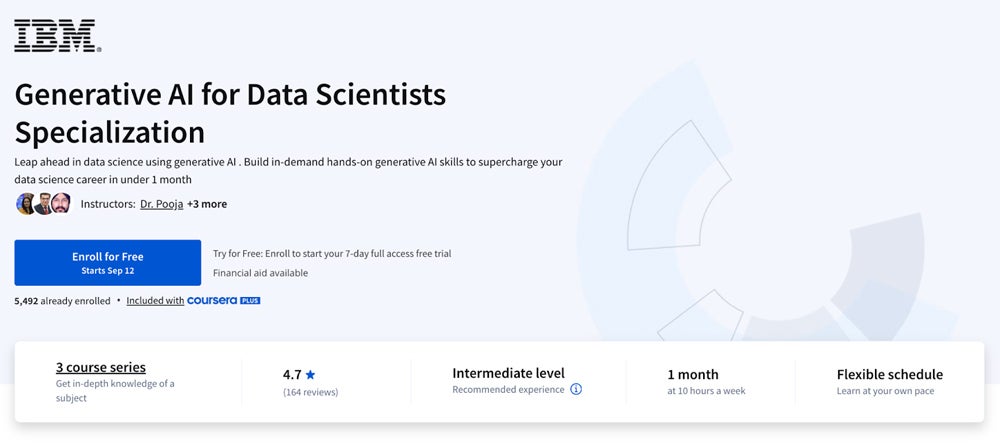
Why I picked it
The specialization is specifically designed for data scientists, and it deep-dives into real-world data science problems where generative AI can be applied. It includes hands-on scenarios where you’ll learn to use generative AI models for querying and preparing data, enhancing data science workflows, augmenting datasets, and refining machine learning models.
The Generative AI for Data Scientists Specialization course also introduces powerful tools like GPT-3.5, ChatCSV, and Tomat.ai and demonstrates how to seamlessly integrate them into data science workflows.
Skills acquired
At the end of the course, you’ll gain a deep understanding of the following:
- Real-world generative AI use cases
- Popular AI models and tools for text, code, image, audio, and video
- Appropriate generative AI tools for data science
- Generative AI prompt engineering concepts and examples
- Prompt techniques to generate and augment datasets for developing and refining ML models
Key course details
Whom it’s for
- Data scientists and aspiring data science professionals who want to apply generative AI into their projects
Career tracks
- Data scientist, data analyst, AI consultant, and product analyst
Course requirements
- Prior data science experience
Course fee, duration, and format
- $49 per month Coursera subscription
- One month at 10 hours a week
- Online via Coursera
Course content and assessments
This three-course series specialization includes the following:
- Generative AI: Introduction and Applications
- Generative AI: Prompt Engineering Basics
- Generative AI: Elevate Your Data Science Career
To pass the three-course specialization, learners must complete three modules for each course, which include readings, assignments, and discussion prompts.
Generative AI with Large Language Models
Best for real-world use case of generative AI and LLMs | Intermediate level
Generative AI with Large Language Models is a joint offering of AWS and DeepLearning.ai, two cloud computing and AI leaders. Through this collaboration, learners can benefit from the expertise and resources of AWS and DeepLearning.ai in the domain of generative AI with LLM, helping them gain foundational knowledge, practical skills, and a functional understanding of how LLMs work and how they can be deployed effectively in real-world scenarios.
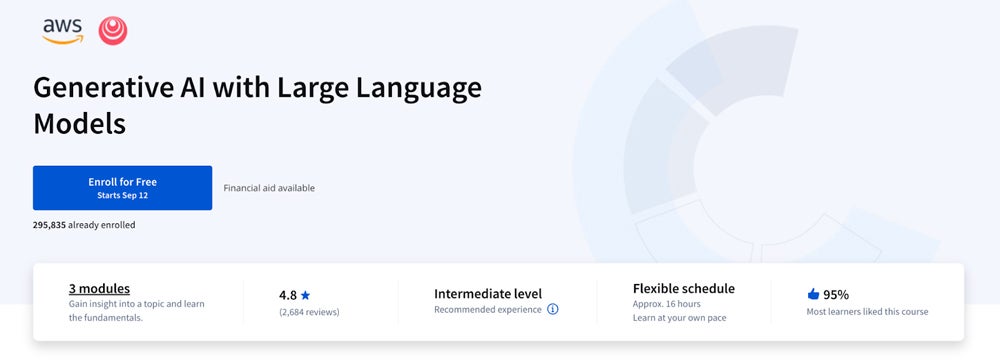
Why I picked it
I chose this certification because it offers a hands-on, practical approach to working with the latest AI technologies in real-world scenarios. Unlike courses that focus solely on the technical aspects of LLM, it tackles the entire generative AI life cycle — from data gathering to performance evaluation and deployment. You’ll also learn from industry practitioners about the challenges and opportunities that generative AI creates for businesses.
Skills acquired
At the end of the three-module course, you’ll gain the following:
- Foundational knowledge and understanding of how generative AI works
- Awareness of the latest research on generative AI and how companies use this technology
- Instructions for expert AWS AI practitioners who build and deploy AI in business use cases
Key course details
Whom it’s for
- AI developers and engineers who want to learn real-life applications of generative AI and LLMs
Career tracks
- LLM model developer, ML engineer, AI product manager, and LLM solutions architect
Course requirements
- Experience with coding in Python
Course fee, duration, and format
- $49 per month Coursera subscription
- Approximately 16 hours
- Online via Coursera
Course content and assessments
There are three modules in this course:
- Generative AI use cases, project life cycle, and model pre-training
- Fine-tuning and evaluating large language models
- Reinforcement learning and LLM-powered applications
Generative AI for Software Developers Specialization
Best for integrating AI into development workflows | Intermediate level
Whether you’re a seasoned developer or a beginner, this specialization will help you enhance your programming capabilities by incorporating generative AI techniques into your projects.
Throughout this specialization’s three self-paced course series, you will learn the basics of generative AI, including its applications, models, and tools for generating text, code, images, audio, and video. You will also learn about prompt engineering, exploring approaches and tools such as Prompt Lab, Spellbook, and Dust to enhance your generative AI skills.
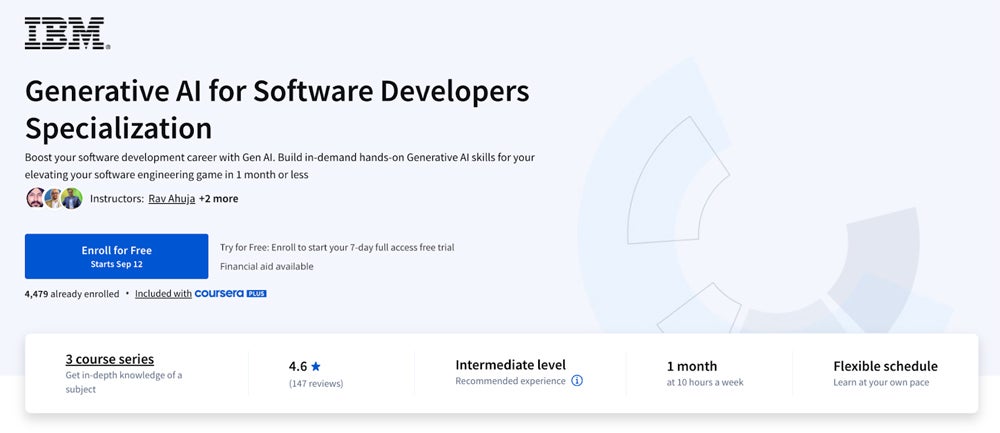
Why I picked it
This course provides hands-on experience with tools like IBM watsonx and open-source libraries to help you integrate generative AI into development workflow tasks. You will also benefit from the knowledge and expertise of IBM and learn the latest advancements and best practices in the field. This specialization format breaks down the learning into manageable modules, offering a structured and comprehensive approach to mastering generative AI.
Skills acquired
At the end of the three-module course, you’ll learn the following:
- Real-world generative AI use cases and popular generative AI models
- Tools and techniques to generate snippets, scripts, test cases, and applications using generative AI models
- Generative AI prompt engineering concepts and examples
- How to develop innovative software engineering solutions using AI-powered tools and LLMs
Key course details
Whom it’s for
- AI developers and engineers who want to learn real-life applications of generative AI and LLMs
Career tracks
- LLM application developer, full-stack developer, prompt engineer, and solutions developer
Course requirements
- Knowledge in software engineering
Course fee, duration, and format
- $49 per month Coursera subscription
- One month at 10 hours a week
- Online via Coursera
Course content and assessments
This three-course series includes the following:
- Generative AI: Introduction and Applications
- Generative AI: Prompt Engineering Basics
- Generative AI: Elevate Your Software Development Career
Real-world applications of generative AI certifications
Generative AI certifications aren’t just about theoretical knowledge; they equip professionals with the skills to tackle diverse real-world challenges across industries. Here are some of their notable applications.
Content creation and marketing
Generative AI certifications empower marketers and creatives to produce high-quality content for various platforms. They help them understand how to use AI tools effectively, including prompt engineering, content generation, and data analysis.
Content creators and marketing teams can develop ad campaigns, generate engaging website copy, and brainstorm blog post ideas using generative AI solutions. Beyond content ideation and generation, AI tools increase productivity and efficiency, so having the skills to automate repetitive tasks and simplify workflows will help marketers focus on strategic initiatives.
Product design and prototyping
Mastering generative AI empowers product designers to accelerate innovation through rapid prototype creation. Using the right AI tools, designers can automatically generate design variations and concepts, freeing valuable time for creative exploration and ideation. With targeted prompts, generative AI models can produce UI/UX mockups, technical documentation, and user stories precisely aligned with the design objectives.
Data generation and training
Generative AI creates synthetic but realistic training data for AI models, enhancing output quality and reducing the need for extensive real-world datasets. It makes for reliable predictive analytics tools by automatically analyzing historical data and forecasting trends. Mastering the right generative AI tool for data generation and AI model training gives data professionals a significant competitive advantage.
Enterprise implementation
Within organizations, certified experts lead the implementation and deployment of generative AI technologies to automate manual tasks, personalize user experiences, and drive innovation. Certified AI professionals can lead the adoption of generative AI solutions for different business use cases, including knowledge management, workflow automation, and scalable solutions.
Frequently asked questions
Does generative AI require coding?
It’s not always necessary. Building a generative AI model from scratch often requires coding to customize it for specific needs, but when dealing with pre-built models, extensive coding is not required, as these models have user-friendly interfaces and require little to no programming. Additionally, there are no-code solutions that come with drag-and-drop interfaces and natural language prompts that let you construct generative AI apps without writing a single line of code.
Is a generative AI certification course worth the investment?
If you are interested in building a career in AI, yes. Certifications make you stand out to potential employers and demonstrate your commitment to continuous learning and development. Or if you are interested in learning more about generative AI and its applications in various industries, a certification course may be worth the investment. It can help you gain valuable skills and knowledge to apply to your current job or transition into a new career.
How can I choose the right generative AI certification?
The best generative AI certification course for you will depend on your knowledge and experience with generative AI and your specific goals and interests. If you are new to generative AI, look for beginner-friendly courses that provide a solid foundation in the basics. If you are more experienced, consider more advanced courses that dive deeper into certifications for prompt engineering, model fine-tuning, deployment, and more.
Ensure the course covers the topics and skills you are interested in learning. As much as possible, only take courses from a reputable institution or organization in the field. A certification from a recognized entity can boost your credibility and increase your chances of getting hired. Also take into account your schedule and preferred learning style. Look for courses that offer flexible timing, online options, and self-paced learning and that are within your budget.
Can I become an AI expert without a degree?
Having a degree in computer science, engineering, or a related field provides a strong foundation when breaking into the AI field, but it’s not needed. You can become an AI expert without a traditional degree by taking certifications, building your portfolio, and seeking mentorship within the AI community.
Platforms like Coursera, edX, and Udacity offer numerous affordable AI courses and certifications that can help you expand your knowledge and hone your skills. You can also build your portfolio through hands-on projects or contribute to open-source AI projects to learn from AI experts. Additionally, you can seek mentorship from professionals who can provide guidance, support, and connections within the AI community.
What companies should I work for post-certification?
After completing a generative AI certification, you may be interested in working for these top companies that are leaders in AI and technology.
- Google is known for its innovative use of AI and machine learning in various products and services, such as Google Photos, Google Search, Google Assistant, and Gemini. Working at Google will allow you to work on projects that will help develop your generative AI skills.
- NVIDIA is a leading technology company specializing in graphics processing units (GPUs) and AI computing. It is heavily involved in research and development in AI, including generative AI for applications such as image generation and style transfer. Working at NVIDIA means being involved in advanced AI projects at a company that employs the world’s leading experts in artificial intelligence.
- OpenAI is an organization focused on artificial intelligence research and development. It is known for its work in creating advanced AI models, including generative models such as GPT-4, Dall-E, and more.
Bottom line: Best generative AI certifications
Generative AI certifications are gaining popularity, as the technology is transforming the tech landscape, driving creativity and innovation. The best programs offer a comprehensive curriculum, hands-on experience, and industry-recognized credentials tailored to your career goals. My recommendations highlight top programs that meet these standards, helping you choose the right path to boost your skills and expand your career opportunities.
Know more about the innovation giants shaping the future of AI by exploring our list of the top generative AI companies.